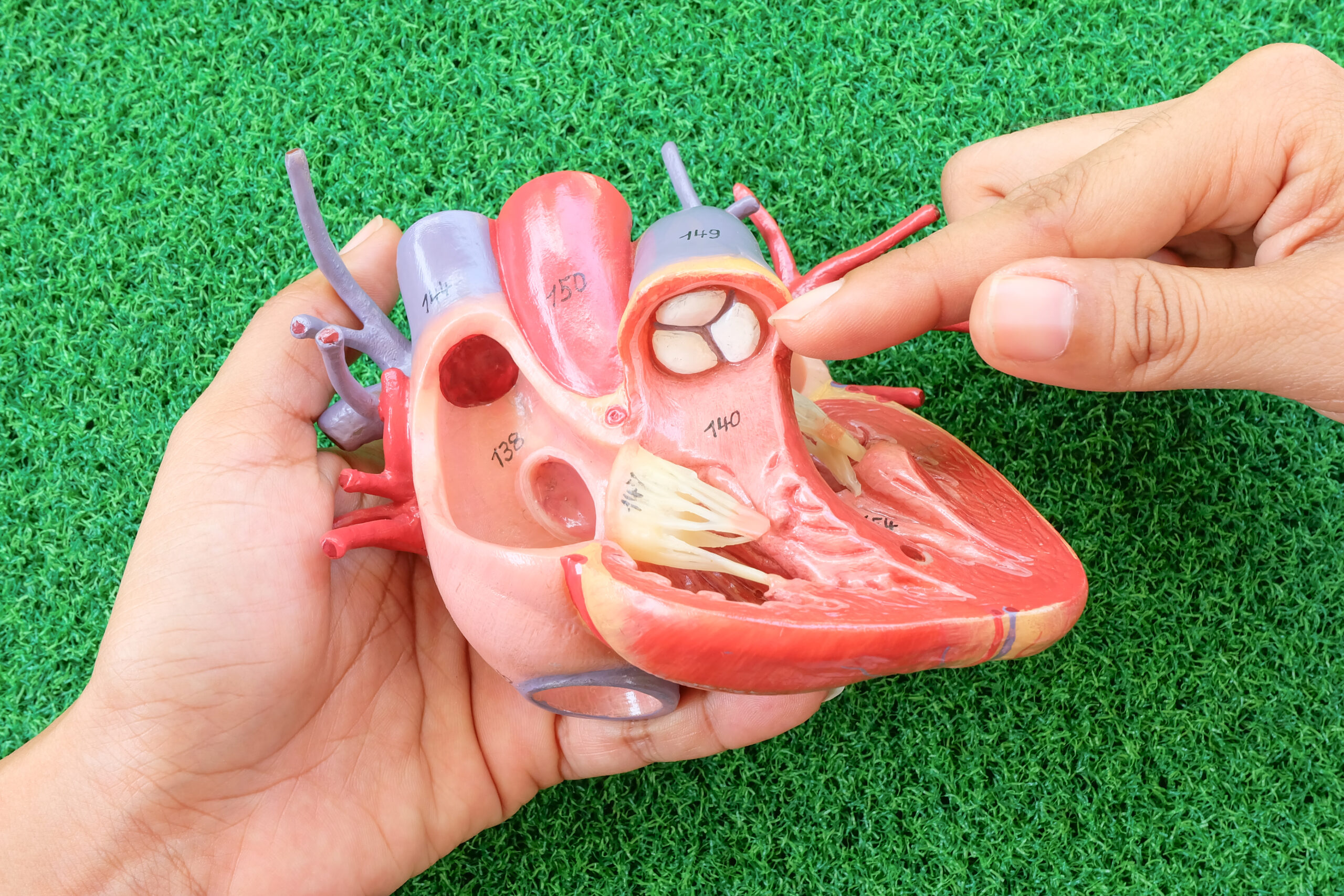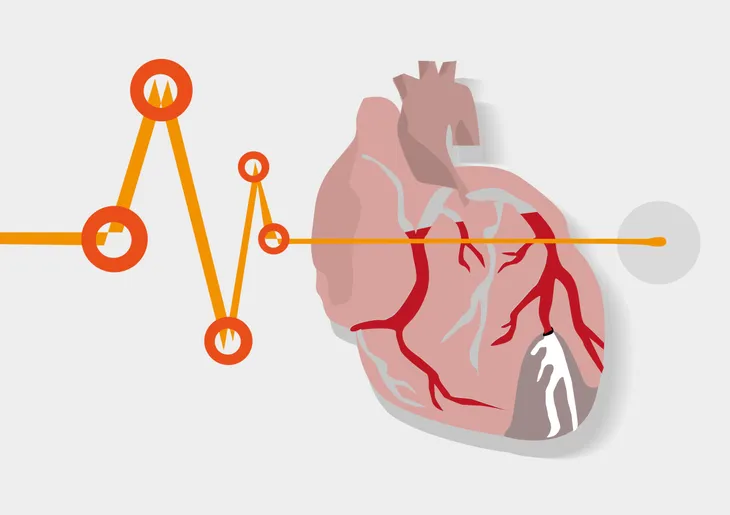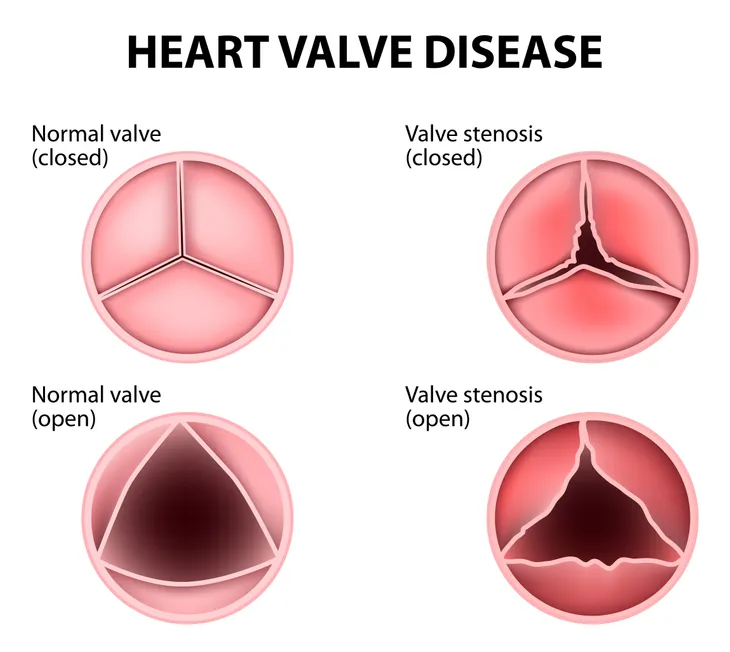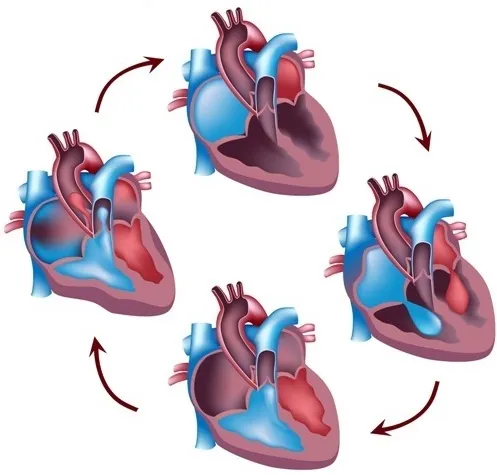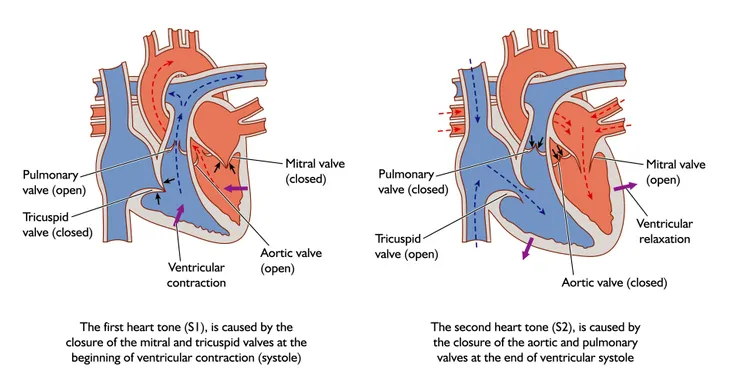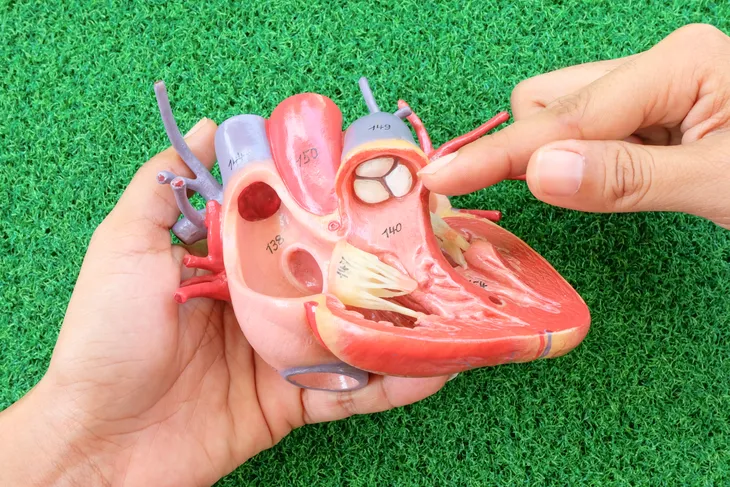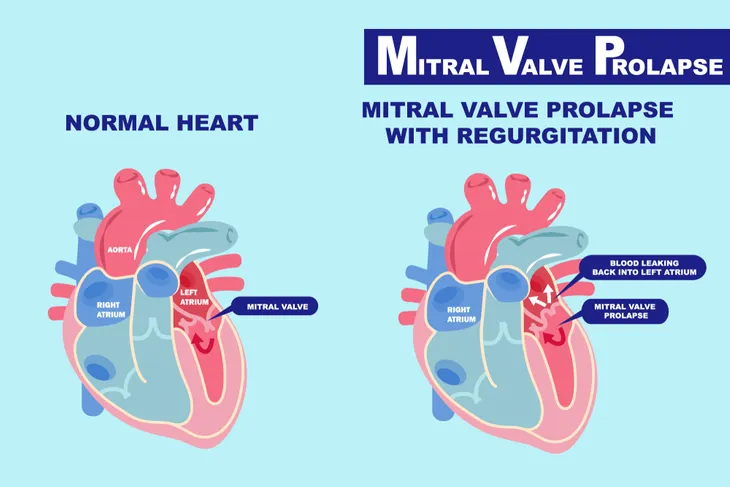Heart valve disease affects millions of people every year and can be an extremely dangerous condition if left untreated. In this article, we will give you an overview of the different types of heart valve disease, the most common symptoms that come along with it, and what to do if you are diagnosed with it.
Let’s take a look…
1. What is Heart Valve Disease?
Also known as “valvular heart disease,” this condition is basically when one (or more) of your four heart valves stops working properly. According to the American Heart Association, there are about 5-million people in America who are diagnosed with this condition every year.
2. How Do Heart Valves Operate?
The heart contains four valves two on each side that are designed to keep the blood flowing in and out of your heart in the right direction. The blood flow inside your heart is a one-way street, with the valves ensuring that the right amounts of blood flow into your heart and that none of it accidentally starts to flow backwards.
Blood flows into the ventricles through the atria, while the tricuspid and mitral valves are open. When the ventricles are full, those two valves shut to prevent back flow. When the ventricles contract, the blood is forced through the pulmonary and aortic valves and arteries carry the blood to various parts of the body. Once the force of the blood subsides, those two valves once again shut to prevent blood from travelling in the wrong direction.
This cycle repeats over and over again, cycling your blood through your heart and rest of your body.
3. How Many Types of Heart Valve Disease Are There?
There are multiple types of heart valve disease, which shouldn’t come as a surprise considering there are four different valves, each of which can malfunction in their own unique way. Any single valve working improperly can result in disease.
Stenosis is when the opening of a valve narrows, preventing it from letting an adequate amount of blood flow in (or out). Insufficiency is when the valve fails to prevent blood from flowing backwards. All four valves can suffer from stenosis, which can cause the heart to work extra hard to pump blood. All four valves can also suffer from insufficiency, which typically results in the body not getting enough blood flow.
So in total, there are technically eight different types of heart valve disease (two types for each of the four heart valves). It can develop in just a single valve or sometimes in multiple valves simultaneously.
4. Cause: Congenital Heart Diseases
Sometimes heart valve diseases develop simply because of old age, as your body starts to wear down and work a bit slower than it used to. However, there are a few other causes that you should be aware of.
First up are congenital heart diseases. In other words, your predetermined genetics (decided for you way before you are even born) make you more likely to develop heart valve disease. In most cases, congenital valve disease affects the aortic or pulmonary valves. They could be the wrong size, have malformed leaflets, or have leaflets that don’t attach properly. Again, these are essentially birth defects that you might only notice as your body gets older and grows.
5. Cause: Bicuspid Valve Disease
This is a condition that affects the aortic valve and is also congenital. Instead of the normal three leaflets, the aortic valve develops with two leaflets. Lacking one of the leaflets, the valve may be too stiff or too leaky, causing problems with opening and closing or simply not being able to shut tightly enough to prevent back flow.
6. Cause: Acquired Valve Disease
Unlike congenital versions of the disease, acquired valve disease occurs when once normal valves start to malfunction. Instead of blaming genetics, there are a couple of different potential causes.
The first is rheumatic fever, a condition that is typically the result of an untreated bacterial infection (most commonly strep throat). Rheumatic fever isn’t very common today, since antibiotics are so prevalent and effective. However, people who do fall victim to it risk inflammation of their heart valves, especially children. Oddly, the effects of this might not show up until a few decades later.
The second cause is endocarditis, a condition where bacteria enter the bloodstream and attack the heart valves. The result can be abnormal growths or holes in the valves, resulting in scarring. This typically results in leaky valves. The bacteria that cause endocarditis are typically from unsterile dental or surgical equipment, intravenous (IV) drug use, or other severe infections.
7. Cause: Mitral Valve Prolapse
The final major cause of heart valve disease is known as mitral valve prolapse (MVP). It’s a very common condition, affecting as many as 2-percent of the entire population. In short, this causes the leaflets of the mitral valve to accidentally drop into the atrium when the heart contracts. This can cause the valve to become stretchy and create leaks. This is one of the most mild forms of heart valve disease, as it rarely even comes with symptoms and typically doesn’t even require treatment.
There are a number of other less common causes of heart valve disease, including coronary artery disease, heart attack, cardiomyopathy, syphilis, high blood pressure, aortic aneurysms, connective tissue diseases, tumors, radiation, and some types of drugs. Be sure to disclose any of these things to your doctor if heart valve disease becomes an issue.
8. What Are The Symptoms of Heart Valve Disease?
There are a bunch of symptoms of heart valve disease. Some may appear on their own, but they can also appear in combination with one another. Some of these symptoms are also associated with other medical issues, so be sure to consult a doctor if you recognize any of the following symptoms.
A patient with heart valve disease may experience shortness of breath or difficulty catching their breath. You may have to sleep in an upright or propped up position in order to breathe easier. You might also experience weakness, dizziness, or even a sudden feeling that you’re too weak to carry out normal daily activities, including a dizzy feeling that might lead you to passing out.
You could also experience chest discomfort or pressure. It might become worse during physical activity or when hit with a sudden burst of cold air (like stepping outside in the winter). You might feel some heart palpitations. These are defined as a rapid heart rhythm, irregular heartbeat, or skipped beats. It may be difficult to recognize these symptoms yourself, so it’s best to consult with a doctor.
Other symptoms include swelling in the ankles, feet, or abdomen. This condition is technically known as edema and may cause you to feel bloated on a frequent basis or cause rapid weight gain. Those suffering from heart valve disease could see weight gain of 2- to 3-pounds per day.
Note that the severity of the symptoms are not always directly associated with the seriousness of heart valve disease. You could have a severe case, but be symptom free. Alternately, you could be suffering from multiple symptoms, but only have a mild case of heart valve disease.
9. How Can It Be Diagnosed?
Although this article is hopefully helpful, you really need to consult a doctor to confirm a diagnosis of heart valve disease. A doctor will talk to you about your symptoms and perform a physical exam as well as additional tests.
A physical exam will include listening to your heartbeat to listen for the sounds of the valves opening and closing. A murmur, or swishing sound, may indicate a leaky valve. A doctor will also listen to your lungs to determine if they are retaining fluid. If they are, it’s a sign that your heart isn’t pumping blood as well as it should. Other parts of your body could show signs of poor circulation or failing organs, which are also signs of poor blood flow caused by heart valve disease.
Beyond the physical exam, a doctor will probably ask for additional tests, such as echocardiography (transthoracic or trans-esophageal) or cardiac catheterization (also known as an angiogram). They are both imaging tests (one using ultrasound and the other using contrast dye and a special x-ray machine) to determine whether your heart is healthy and functioning properly.
You may have to do some of these tests multiple times, so that a doctor can track the progress (positive or negative) of your heart valve disease.
10. What Treatment Options Are Available?
There are various treatment options available, depending on the severity of the problem and the eventual goal of the treatment. It breaks down into three main options: protecting your valves from further damage, lessening symptoms, and repairing or replacing faulty valves.
11. Protecting Valves
Heart valve disease puts you at a higher risk of developing endocarditis (an infection of the heart valve), a much more serious heart condition. Surgically repairing or replacing valves will also increase the risk, so many patients opt for treatment designed to simply manage heart valve disease. To protect your valve(s) from further damage, try the following things.
Be up front with your doctors and dentists about having heart valve disease. It will help them make informed decisions about how they treat you. You can also carry an ID card from the American Heart Association, in case you ever end up needing emergency care. You should also call your doctor immediately if you have symptoms of an infection, such as a sore throat (it could be strep), general body aches, or a fever. Take care of it before it gets worse!
You need to take good care of your teeth and gums and visit the dentist regularly. Many of the bacteria that can damage your heart valves come from the mouth and are due to poor dental care.
Lastly, consider taking preemptive antibiotics before you undergo any procedure that might cause bleeding, including basic dental visits, invasive testing, and any surgery (even minor ones). Be sure to consult your doctor regarding this step, as there are different recommendations depending on which type of heart valve disease you have.
12. Medications
There are various types of medications you can take to treat heart valve disease. Some reduce the chance of further damage, while some simply keep symptoms under control. If you are a candidate for surgery to repair or replace a valve, you may be able to stop taking the medication after the surgery is successful. Other drugs are taken on an ongoing basis, perhaps for the rest of your life, to keep the issue from getting worse.
Some of the most common medications for heart valve disease are diuretics, which are used to remove extra fluid from the tissues and bloodstream and to decrease the likelihood of heart failure. Also, anti-arrhythmics, which are used to control the heart’s rhythm and create a stable heartbeat, may be used. Vasodilators work to decrease the heart’s workload by opening up blood vessels and prevent back flow through the valves, and angiotensin converting enzyme (ACE) inhibitors are a specific type of vasodilator used to treat high blood pressure and heart failure. Beta blockers, which are used to treat high blood pressure and decrease the heart’s workload by helping it beat slower and with less force, may also be used to treat heart valve disease. And lastly, anticoagulants (blood thinners) can be used. These help prevent blood clots from developing on your heart valves.
As with any medication, follow the instructions of your doctor carefully when it comes to how much and how often you should take it. Make sure that you disclose any and all medications to every health professional you deal with.
13. Surgery
After a series of tests, your doctor may recommend surgery to fix your faulty heart valve(s). Surgical options include repairing your current valve or replacing it with an artificial one. There are numerous types of heart valve surgery, depending on the severity and location of your particular ailment.
The newest procedure is transcatheter aortic valve replacement (TAVR), although traditional heart valve surgery and percutaneous balloon valvuloplasty are also common options. A less invasive procedure called the MitraClip is also potentially an option, where a small clip is placed to help the mitral valve close properly.
